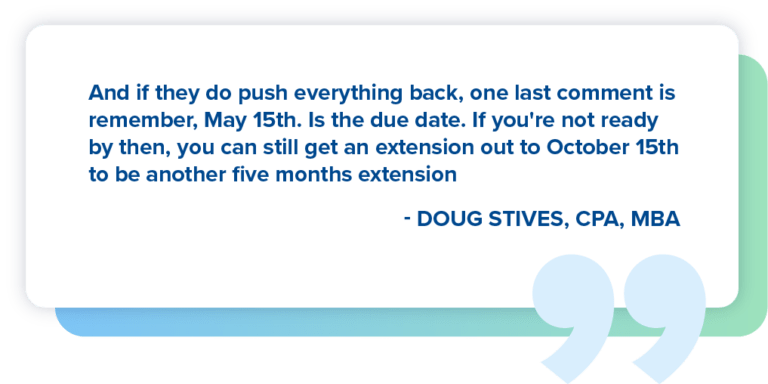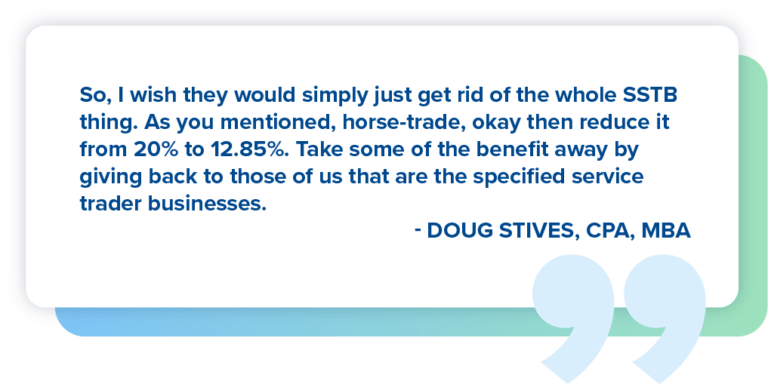
Greetings. Can you see the light at the end of the tax season tunnel?
Pushing forward, we are proud to present a new Q&A Special that’s timely and topical.
Sharon Kreider of Western CPE interviews tax expert Doug Stives in this insightful Q&A discussion about the May 17 deadline, upcoming tax increases, QBI elimination, and 1031 exchanges.
Doug Stives examines if the extensions were generous to the right groups, explores QBI elimination or simplification, and answers an interesting 1031 exchange question.
LISTEN NOW TO THE Q&A SPECIAL
Click the play button below to listen.
Transcript:
[Sharon]
I’m Sharon Kreider and I’m with Western CPE. I’m in beautiful downtown Bozeman, Montana, and it’s 73 degrees. And today, we’re doing some questions and answers. I have the questions for Doug Stives. Doug Stives is an accounting professor at Monmouth University in New Jersey. And he’s here to share some wisdom.
Now, um, some of our viewers know you, Doug, because they’ve been to various resorts where you have entertained and informed them on tax law and our tax law update. And I knew last year that you and I argued over who got to go to Whitefish Montana, next to Glacier National Park. And you won.
Our first question is the deadline for filing the individual form 1040 has been postponed by the IRS generously from April 15th to May 17th. Can you tell us a little bit about that? And what’s not included in this extension.
[Doug]
Yeah, Sharon. It’s good news. I think we all agree with that. I was in my accounting firm’s office this morning.
I don’t go there very much anymore since I’ve been teaching, but the panic hasn’t quite set in yet. They’ve got another month and that’s a good thing, but the service and Congress and their usual foot-dragging didn’t do enough. If you have a fiduciary tax return, if you’re doing a tax return for a Trust or an Estate, that’s still due the 15th of April, if you’re doing a Corporate return for a C-Corp that’s still due the 15th of April.
[Doug]
So, all they did was push back the deadline for the individual 1040s. The other thing they did, which was kind of nasty. And even this morning, I read an article online that was talking about this. Believe it or not, some people in Congress pressured to make this happen, to push back the due date for the first quarters estimated taxes for 2021, the May 17th date as a postponed date for the 2020 Tax returns and any balance due that you will or will not accrue interest until after May 17th. But the problem is people like myself that have outside income beyond what I make at the school, is I have to get together my first quarter estimated tax. Uh, by the 15th, which is coming up so less than two weeks away.
So what am I doing? This is a very important point. Here is if I goof off and I don’t put any money in, on April 15th at the end of 2021, more likely than not, IRS is going to penalize me for making that first-quarter payment late. They penalize you at the equivalent of 3% interest. So that’s cheap.
[Doug]
Yeah, but my money’s sitting in my checking account is making 1/100th of a percent. So, I would be just playing dumb If I didn’t take some money out of my checking account, and send it to the Federal Government. And while I’m at, to the state of New Jersey, they don’t deserve it. But essentially anyhow, just because plain old economics doesn’t make any sense.
So that’s what I’m doing. We’ll watch it. And if they do push everything back, one last comment is remember, May 15th. Is the due date. If you’re not ready by then, you can still get an extension out to October 15th to be another five months extension. So just some food for thought there. And don’t forget again, don’t miss that first-quarter payment.

In fact, what I’m going to do, I’m going to send an extension in before April 15th, put some money with it, for what I think I might possibly still owe for last year. And, what I estimate I owe for the first quarter of this year. Then any overpayment when I do the return, maybe in May, June, July or August, whatever. We’ll roll over to 2021. So I’m just ducking a penalty. I don’t, I don’t like paying penalties. Nobody does.
[Sharon]
Now we know that President Biden has proposed a $2 trillion infrastructure plan. So you and I know or expect that there will be tax increases. And certainly during president Biden’s campaign, he told us that he wanted to see tax increases.
So my question is… What are you doing to plan for your small business clients, assuming that tax rates are going up?
[Doug]
Holding on to my wallet is the first thing that comes to mind. They are going to tax it. There’s this myth that they’re only going to tax the very wealthy. That’s partially true, frankly, because remember at the lower end, they’re talking about raising the Child Credit going from $2000 up to $3000, and maybe even paying that out during the year.
But to answer your question for the business clients, what are they going to do with depreciation? You know, and I know since 2017, we were just having a great time with Section 179, expensing depreciation, and also 168, your bonus depreciation that could dry up very quickly. The other thing that I think is I know is on the cutting board is the QBI.
You and I both respectfully hate that thing because it’s so ridiculously complicated, but it saved me money for the couple of years it’s been around. And anybody else who does a schedule C or for that matter people in Real Estate. So many people, it knocked off the taxability of 20% of their income.
Remember where that came from the QBI. It was Congress’s reaction to reducing the Corporate tax rate from 35% all the way down to 21%. So I said, wait a minute, everybody in the world’s going to run out and incorporate. So we have to give the unincorporated in case something and they did, they just made it ridiculously complicated.
So one of my wishlist items, which we’re going to cover in a few minutes, Sharon, is that they maybe straighten out QBI instead of eliminating it, simplify it. But that’s, I’m, I’m afraid really a pipedream on my part. They’re going to pay more tax and in line with that. You’ve got to watch your cash flow.
If you’re having to increase your quarterly estimated payments, whether you’re incorporating or not. And you’re going to be taking, probably paying more payroll taxes in the shadows are talking about jacking that up and the States are all broke. So they got to raise the unemployment contributions and disability and all the things that the state offers as fringe benefits, let alone the cost of insurance, medical insurance.
To name one who’s paying for all these COVID tests. The insurance companies are. You think they’re going to sit still in that and not raise your premiums? Well, then you’re wrong. Okay. So businesses really have to suck it up a little bit and watch what they spend. The economy is strong right now. We can come crashing down. And if you run out of money, I teach my students this all the time. You could have the best idea in America, but if your cashflow dries up, you’re out of business.

[Sharon]
Cash is King. Is that what you want to say?
[Doug]
Well, that’s a Vern Hoven quote that I’ve always liked. Yes.
[Sharon]
Okay. Well, tell me now, Doug, how are you planning to find staff to handle the inevitable additional work that we’re going to have with more rules, more requirements, and changes to what we just learned?
Uh, this year, last year, the year before. So, where are you going to get staff?
[Doug]
Well here, here’s the reality. Uh, remember I teach at a University. I’m full-time and we graduate students. We’ve been graduating until the last couple of years, anywhere between 35 and 40 accounting graduates every year. And 90% of them were finding jobs, not necessarily with big four firms with jobs we’re out there. This year, we’re going to graduate maybe 25. I’ve had a couple of drop-out from our accounting program. And the reason is this, this will stymie some people that might be watching this. But accounting is too hard. I don’t want to have to go take that CPA exam, but more importantly, Sharon, they’re saying to me, I don’t want to work 70 or 80 hours a week. That’s slave labor. I don’t want to go there.

So the profession has a bad rap and I was in my own office this morning. I mentioned earlier, and they have 27 people. So, we’re a small local firm. They are three people short at this point. It has landed a couple of new clients and have no idea how they’re going to service it.
They said, Doug, do you have any people that didn’t get a job yet? No. No. A couple of years ago, there were almost no internships this year. I’ve got that. Nah, about six or seven kids that are seniors right now. They’re doing internships as I speak to you. So the job market is stronger than ever. And the pool of graduating accountants is way down.
It’s not just at Monmouth’s where I teach. it’s all over the country, and I can confirm that. That’s a little scary because when you asked me the question a minute ago, you said Doug, with all of these new regulations and Huh GAP Isn’t going to get easier. You know, those boys up in Connecticut, they don’t sleep much.
They crank out some of these things that make Tax law look simple. So the big message I’m going to leave before I stop talking is raise your rates and throw out your nonprofitable clients. So they don’t pay you. Throw them out, get them an extension and say, when you pay me for last year, now pay me for this year ahead of time, I may consider doing your work.
I’m just overwhelmed. You can’t get to the hospital. This fall, you can’t even get to the doctor’s office. Appointments are taken. So why, why do we roll over and play dead for some of these clients that don’t want to pay us what we’re worth? I’ll calm down and go to the next question.
[Sharon]
Hey Doug, you and I know that changes are inevitable. We are going to have tax changes. Maybe later this year, maybe next year something’s going to happen. Um, do you have a wishlist of changes you’d like to see? And before I let you answer that question, you probably have seen that I wrote as if I were advising president Biden on what I think tax changes ought to be.
And a lot of what I started with this is horse-trading. We didn’t like the term, Oh, they traded this for that. But when you lose the ability to trade, then we have a frozen Congress. But I think you and I have some ideas, maybe what would be good for the President to do, what might be good tax policy?

So tell me your wishlist.
[Doug]
Okay, yes, I have a wishlist, but before I give you those, I’m going to hide for a minute. If you remember, nothing’s going to happen right away, I’ve had people approach me as you have, probably just in the last couple of weeks or just since the President gave a speech, what was earlier this week.
They said, well, when does that take effect? It’s not even long yet, you know that, and I know that, but want to make sure all of our viewers understand that. Remember when Trump came in four years ago was going to reduce the tax. When did that legislation pass? It passed December 22nd? And, it didn’t take effect until the next year.
Well, the same thing happened this year. I don’t know. People have been scared to death. Are they going to make it retroactive January 1st? They can. And somebody challenged me the other day. They can’t do that. They can do whatever they want. They’re the US Congress. What are you gonna do, sue them? So, yeah, they’re going to be rate increases. There’s no question about it.
[Doug]
And, then to get to my wishlist. The two things I have written down here is they have to fix the QBI. I mentioned earlier they might actually get rid of it. What I think is just so unfair and just unfathomable is the fact that people like you and me, Sharon, as CPAs, we don’t get the QBI. But if my neighbor who’s a very successful plumbing contractor makes a million dollars. He doesn’t pay tax on 20% of that. Where’s that going? The plumber, the electrician. I respect these guys, but we worked just as hard if not harder. So, I wish they would simply just get rid of the whole SSTB thing. As you mentioned, horse-trade, okay then reduce it from 20% to 12.85%. Take some of the benefit away by giving back to those of us that are the specified service trader businesses.

Second on my list is step-up-in-basis. Now I’m going to be reasonable on this. If somebody dies and they’re worth a hundred million dollars, and all their assets get stepped up to that day to death, I’m sure there’s a bunch of Estate Tax unless They’ve done some careful planning. We know that, but maybe there should be some kind of a ceiling and they’ve been banging around in Washington the last few weeks talking about, well, the first million, you could still step-up-in-basis. And just to make sure everyone knows what we’re talking about. if I have IBM stock that I paid a dollar for 50 years ago, and it’s now worth a hundred and some dollars. If I sell it, I have a gain of almost the whole hundred dollars.
If I leave it in my Estate, my kids take it over and sell it the day after I die, which they told me they’re going to do, then what happens? They pay no Capital Gains Tax. They get a step-up-in-basis and it’s been around forever. It’s been on the chopping block before it’s there and say, some people may shoot me by for saying this, but maybe they tone it down a little bit. I always quote the Canadian method. You probably know if somebody dies in Canada, there’s no Estate Eax as such, but the Estate pays Capital Gains tax as though the decedent sold everything that they own on the date, they died with some notable exceptions, their primary residence up to a certain value.
And I think it’s the first $50k or a hundred thousand dollars. I’m guessing at those numbers. Congress knows about this and that’s very likely what may happen. And frankly, I could live with it. You pay the Capital Gains tax and then you’ve got your ste- up- in-basis, but you had to buy it. And I mean, I could get real prolific here and say, let’s not have a rate increase. That’s unrealistic. We have to have a rate increase. I’ll leave you with this. Does anybody realize how much a Trillion Dollars is? In most of my presentations I show a slideshow that says, if you take $1 for every second, $1 a second, $60 in a minute and so forth. How many years until you reach one trillion, not five or six trillion, and as Congress is spending the last year, $1 trillion? The answer is 31,710 years. That’s before recorded history and a dollar second, just to get to one tril as I like to call it. These people are out of their minds spending trillions of dollars that we don’t have. They have to pay for it.
So we’ve got to sit back and we’re going to have a rate increase. Will it work? I don’t know. One side of my brain says, I hope it does. But I say, I hope it doesn’t. We’ll have to see what happened, Sharon. If I could give you the prediction on that, I wouldn’t be wasting my time.
[Sharon]
No, you wouldn’t be with me answering tax questions? You’d be down, uh, buying stock. Well Doug, we have a question from a very, very sophisticated tax planner with some questions that I think have application as people are moving their property around. So this is about 1031 exchanges. The tax practitioner has two clients, brothers.
That did a 1031 exchange. They own the original property in their individual names. They then sold the property and did a 1031 exchange with the proceeds from the sale. With the proceeds, they purchased one property and used the balance of the proceeds to make a down payment on a second property.
They currently own both properties in their individual names. And the first question is. They’d like to transfer property one into an LLC, that they’ll be the only members of. They also have property two and they want to transfer that ownership, but add a new owner, their mother.
So that one would be a three-member LLC with the third member as the client’s mother. So the question is first. They’re going to switch property one from individual ownership into an LLC. Does that trigger any section 1031 gain?
[Doug]
I think everything you said works Sharon. To answer your last question is by taking property that I already own and contributed it to an LLC or for that matter a Corporation. Which we both agree to be insane with real estate, but some people think it’s a good idea. It’s not a taxable event. The corporation’s 351 protection. What is it, 721 or something protection with the partnership or LLC. We both know that. But here’s the thing I want to go back to the beginning. If they currently, before they sold, before they relinquished the property, they wanted to unload.
If that had been in a partnership, you have to liquidate the partnership because you cannot like-kind exchange. 1031 does not apply to partnership shares, but you didn’t say that you said they owned it 50%, one owner and 50% another individual owner. So I think you’re okay with that. And again, go back to it.
And he said, Oh, well then the deal won’t work because is already in a partnership. Liquidate the partnership. And I hope people will remember that when you pull assets, no matter how appreciated they are out of a partnership, it’s not a taxable event to you until you sell it. So you do that first in this case, that’s not applicable.

Okay. So then what did they do? They would have bought two properties. Can you replace one with two? Absolutely. Can you replace fractional ownerships with fractional ownerships? Absolutely. As long as again, let’s go back to step one, it has to be business or investment property. It can’t be their home and can’t be a property that any of them have lived in for at least two years before they buy it, and at least two years after they replace it. All the other rules, you have the identification of 45 days, the replacement and then 180 days. You mentioned they put a down payment on a second property. I hope that they closed on it and put the rest of the money up.
And then last but not least, bringing the mother in. I don’t see that as a problem. If she were to invest some money in, okay, that’s fine. Or if they were to gift a third ownership to that. After the deal was all settled and done. My own common sense would be, and I’ve done hundreds and hundreds of 1031s. Don’t do that right away cause I’m starting to think like an IRS agent, which is downright scary because where did this third partner come from?
Let it settle. if you’re doing it in 2021, maybe late 2022 or 2023, you bring mom in. And think about it, If she now owns a third of that property, clearly she’s older than her children, when she dies, you get a step-up-in-basis. Unless what we talked about earlier, Congress decides that.
One last pop before I sign off here. Congress is thinking about it. They thought about it, even as recently as 2017, to only allow taxpayers to defer tax on 1031 by like kind of exchanges, went up to a million dollars.
They haven’t forgotten that. So that very likely will come to the top of the heap. And as we all know, it’s going to depend on how strong the Real Estate Lobby is. And it’s strong. We know that. Think of all the favors that Congress has done for Real Estate. I’m not against that. The best example is QBI.
And when that came out, well, it doesn’t apply to realtors. They said oh yes it does. And they forced it in at the last hour. So 1031s are alive and well for now. If a client came to me and something that I do, I said do it sooner than later. Because if you do it or you sit on it and you don’t get it done before they change the law, you could be a very unhappy camper.

[Sharon]
The appreciation is so dramatic right now. It might be nice to take your equity in one property and exchange it into two properties and build your empire, your Real Estate Empire. All right. Thank you, Doug. I appreciate you. And maybe I’ll see you in Whitefish, Montana. This year.
[Doug]
That’d be great.
Recent Stories




Senate Finance Committee Revisions to OBBBA


California Corner: FTB Experiencing Technical Issues
Next Up...
- |
- TaxByte
- |
- TaxByte
